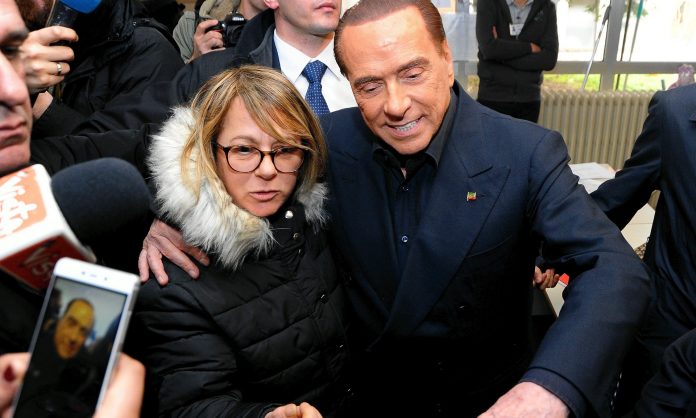About 50% of Italians who voted in national elections on Sunday supported populist parties that were once considered fringe, according to preliminary results released by the interior ministry.
The most likely result of the national election seemed either a win by the centre-right coalition headed by Silvio Berlusconi, the 81-year-old former prime minister, or a hung parliament in which populist parties – the anti-establishment Five Star Movement and the xenophobic Northern League – would have considerable influence in the creation of a new government.
The ruling centre-left Democratic party has already admitted defeat after coming in third according to projections. “This is a very clear defeat for us,” said minister Maurizio Martina. “We are expecting a result below our expectations … This is very clearly a negative result for us.”
Andrea Marcucci, one of the party’s senators in the outgoing parliament, wrote on his Facebook page: “Voters have spoken very clearly and irrefutably. The populists have won and the Democratic party has lost.”
The preliminary results showed Berlusconi’s coalition – which includes the Northern League – winning about 37% of the vote, a result that could potentially help the billionaire media magnate clinch a fourth election victory under a complicated Italian election law.
Analysts were also poring over early data that suggested another potential political upset: Matteo Salvini, the firebrand head of La Lega – as the Northern League is now known – beating out Berlusconi within the centre-right coalition.
Under a “gentleman’s agreement”, whoever emerges as the winner between the two will choose the next prime minister, if the coalition were to win a majority.
Berlusconi is not eligible to serve personally because of a previous tax conviction, but said he would choose Antonio Tajani, the European parliament president, as prime minister.
Two facts seemed indisputable: that Italian voters, who have traditionally been risk-averse, were ready to ditch the big mainstream parties, and that the centre-left party headed by Matteo Renzi had an abysmal election.
“The results are still very unclear,” said Giovanni Orsina, a politics professor at Luiss University in Rome. “The odds are still that there is no majority in parliament. But what is clear is that the centre left were punished. Italians didn’t buy the story of Italy getting better. At least the majority of them did not.”
The Italian economy has significantly improved in since the dark days of the 2011 economic crisis and the PD has taken strong – and controversial – measures to try to stem the flow of migrants into Italy in recent months, but the party was hammered regardless – in part because of the prevailing view that Renzi is out of touch, untrustworthy, and that change has not happened fast enough under his leadership.
Whatever the final outcome, exit polls and partial results appeared to reveal a monumental shift in a majority of Italian voters.
If the centre-right fails to clinch a majority, then the Five Star Movement, an anti-establishment party that was founded nine years ago by former comedian Beppe Grillo, will emerge as the single most powerful party in Italy and decisive in a future coalition, having won up to 31% of the vote, according to early results that were not yet final.
Among other controversial views, the Five Star has expressed deep reservations about the euro – until recently it promised to call a referendum on Italy’s participation in the eurozone – questioned Italy’s role in Nato, and does not support mandatory vaccinations.
In the likely event of a hung parliament, there are several parliamentary combinations that could be cobbled together to win a majority of seats, many of which would pair unlikely bedfellows.
Under some scenarios, the Five Star Movement could combine with the Democratic party to get to above 50%.
“Building a majority in parliament will be hard if not impossible. An extended period of horse-trading among the parties is next,” said Wolfango Piccoli, an analyst at Teneo Intelligence. Parliamentary maths could also allow a majority to emerge through a combination of the Five Star Movement and the Northern League.
But Piccoli said chances of such a coalition deal were “very low”. While both parties are eurosceptic, pro-Kremlin, and anti-free trade, the Northern League’s view are far to the right, particularly on the migration issue, while many Five Star voters identify with the Italian left.
Source https://www.theguardian.com/world/2018/mar/05/italys-voters-ditch-the-centre-and-ride-a-populist-wave






















































